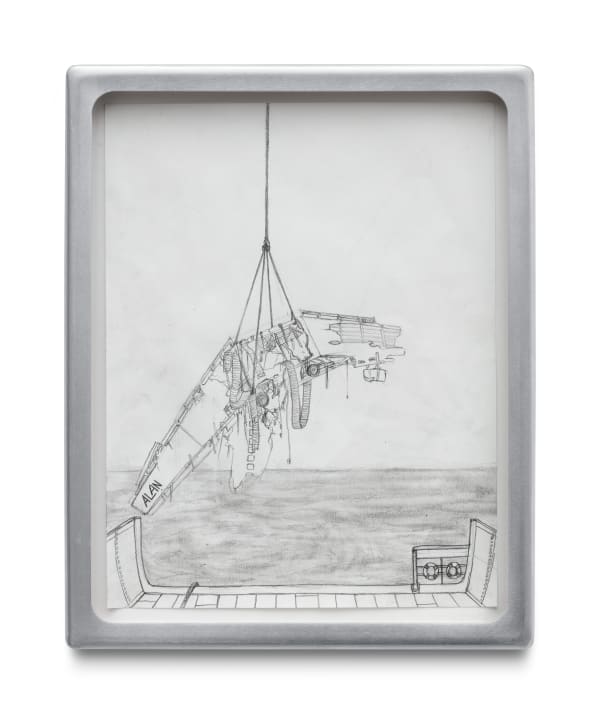[INTENSIFIES]: ANDREA CRESPO
Andrea Crespo’s second solo exhibition at Kraupa-Tuskany Zeidler brings to Berlin one of their videos and
nine drawings by the artist. Crespo presents a series of images depicting machinery, transportation and
warfare as metaphors to address preconceptions ascribed to autism such as coldness, inhumanity and death.
On October 3, 1938, less than five months after Austria was annexed by Nazi Germany, Hans Asperger delivered
the first public talk on autism, presented at the University Children’s Hospital in Vienna where he practiced as a
pediatrician. In a 1944 paper, if not at the talk itself, he used the term “autistic psychopathy”—now referred to as
“Asperger’s syndrome”—in describing “a group of eccentric, withdrawn, but often highly gifted, individuals who
manage social integration despite their somewhat odd social interaction or communication.”* With many attendees
wearing swastikas, Asperger was careful to select only the highest functioning cases of the 200 children he
studied. Since his lecture, the origin of autism has been fraudulently linked to vaccines, falsely connected to school
shooters, deemed a growing public crisis, and subject to incessant trolling. 1930s Nazi propaganda concerning the
neurodivergent is not, at times, dissimilar from recent memes depicting autism—memes such as [autism intensifies].
Andrea Crespo’s animated film [intensifies] (2016) is a story of Alan, a fictional autistic male, as a child and
young adult.
Told from a first-person perspective, we learn his interests include extinction, eugenics, Sonic,
WWII, and airplanes. We follow Alan as he is subjected to a battery of tests administered to learn how to execute
institutional control of his condition. He endures the ridicule of classmates. He refers to himself as an alien and
in computational terms: he wonders if he must “reprogram myself for breeding.” Significantly, the recent book
NeuroTribes: The Legacy of Autism and the Future of Neuodiversity, perpetuates the autism computer metaphor,
proposing we can “understand neurodiversity” by thinking “in terms of human operating systems [italics original].”**
In the film a friend with whom Alan chats online asks about his drawings; Crespo includes Alan’s drawings in the
exhibition, which Crespo created by embodying Alan’s experiences and fantasies. Alan makes numerous drawings
of airplanes, such as ‘Roger that, fuckers’ (all works 2016), which appears technically like he made when quite young,
and ‘The Lone Wolf’, which looks to be made when he was much older, as one can see the development of proficiency
in drawing. Two which convey the most personal pain are also of airplanes, ‘The Mark of Cain’ and ‘MSSNG Plane’,
both which use the image of autism as a “puzzle,” a symbol employed by organizations such as Autism Speaks.
Puzzle pieces partially form destroyed airplanes printed with the registration code ALAN. (It is also worth noting that
MSSNG stands for the project by Autism Speaks and Google which sets out to sequence the DNA of 10,000 families
affected by autism.) Other drawings reference his militarized fantasies while growing up in suburban America, such
as ‘Threat Cleared’ and ‘Suburban Warfare’. While Crespo is known for their highly exacting digital paintings, Alan’s
drawings are not a mode of deskilling or ableism. The drawings Alan makes as he grows older exhibit increasing
precise line and shading. Perhaps the finest illustration of this is ‘Awareness Tower’. It is interesting that the first longdistance autistic communities—since replaced by the internet—were formed through ham radio communications.
— Alise Upitis
















![[intensifies]](https://artlogic-res.cloudinary.com/w_600,c_limit,f_auto,fl_lossy,q_auto/artlogicstorage/kraupatuskanyzeidler/images/view/e95389ad337bdd15436833742b46337cj/kraupa-tuskanyzeidler-andrea-crespo-intensifies-2016.jpg)